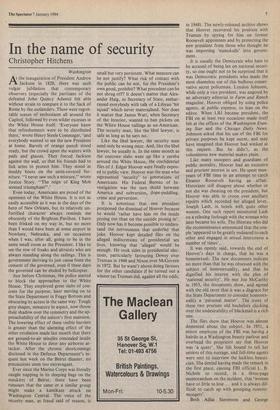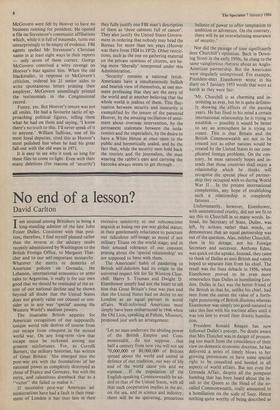In the name of security
Christopher Hitchens
Washington Athe inauguration of President Andrew Jackson in 1828, there was such vulgar jubilation that contemporary observers (especially the partisans of the defeated John Quincy Adams) felt able without strain to compare it to the Sack of Rome by the outlanders. There were regret- table scenes of enthusiasm all around the Capitol, followed by even wilder excesses in the White House itself. 'Everyone knew that refreshements were to be distributed there,' wrote Henry Steele Commager, 'and everybody wanted to see the new President at home. Barrels of orange punch stood ready, but the crowd upset the waiters with pails and glasses. They forced Jackson against the wall, so that his friends had to link arms to protect him. They stood in muddy boots on the satin-covered fur- niture. "I never saw such a mixture," wrote Justice Story. "The reign of King Mob seemed triumphant".'
Even today, Americans are proud of the openness of the White House. It is not as easily accessible as it was in the days of the hero of New Orleans, but its relatively un- fortified character always reminds me obscurely of the Brighton Pavilion. 1 have been frisked on my way in, but no more than I would have been at some airport in Nowhere, Nebraska, and on occasions when I was, after all, going to be in the same small room as the President. I like to see the row of freaks and altruists who are always standing along the railings. This is government deriving its just cause from the consent of the governed, even if these days the governed can be eluded by helicopter.
Just before Christmas, the police started to block the approaches to the White House. They employed great slabs of con- crete for the purpose, later moving on to the State Department in Foggy Bottom and obscuring its access in the same way. Tough grey shapes, minatory in aspect, now throw their shadow over the symmetry and the ap- proachability of the nation's first mansion. The lowering effect of these visible barriers is greater than the alarming effect of the other revelation made last month that there are ground-to-air missiles concealed inside the White House to deter any airborne at- tacker. After the chronic shortcomings disclosed in the Defence Department's in- quest last week on the Beirut disaster, no precautions seem too extravagant.
Ever since the Marine Corps was literally caught napping in its sleeping bags on the outskirts of Beirut, there have been rumours that the same or a similar group might make a kamikaze attack on Washington Central. The voice of the security man, as fraud said of reason, is small but very persistent. What measure can he not justify? What risk of contact with the public can he not, for the President's own good, prohibit? What precedent can be not shrug off? It doesn't matter that Alex- ander Haig, as Secretary of State, embar- rassed everybody with talk of a Libyan 'hit squad' which never materialised. Nor does it matter that James Watt, when Secretary of the Interior, wanted to ban pickets on the White House railings as un-American. The security man, like the libel lawyer, is safe as long as he says no.
Like the libel lawyer, the security man need only be wrong once. And, like the libel lawyer, he usually is. In the same month as the concrete slabs went up like a zareba around the White House, the confidential files of J. Edgar Hoover were finally expos- ed to public view. Hoover was the man who represented 'security' to generations of Americans. His Federal Bureau of In- vestigation was the sure shield between America and subversion, dope-peddling, crime and perversion.
It is notorious that one president postponed the dismissal of Hoover because he would 'rather have him on the inside pissing out than on the outside pissing in'. Only now has it become possible to unders- tand the nervousness that underlay that joke. Hoover kept detailed files on the alleged indiscretions of presidential sex lives, knowing that 'alleged' would be enough. He took sides in presidential elec- tions, particularly favouring Dewey over Truman in 1948 and Nixon over McGovern in 1972. But he wasn't above doing favours for the other candidate if he turned out a winner (as Truman'
ruman did, against all the odds, in 1948). The newly-released archive shows that Hoover recovered his position with Truman by spying for him on former Roosevelt appointees and by protecting the new president from those who thought he was importing 'numskulls' into govern- ment.
It is usually the Democrats who hate to be accused of being lax on national securi- ty, so one ought not to be surprised that it was Democratic presidents who made the most shameless use of this bulbous conser- vative secret policeman. Lyndon Johnson, while only a vice president, was angered by an adversary editorial in Farm and Ranch magazine. Hoover obliged by using police agents, at public expense, to lean on the editor. When LBJ became president, the FBI on at least two occasions made itself felt at the offices of the Washington Even- ing Star and the Chicago Daily News. Johnson asked that his use of the FBI for private purposes be kept secret, and may have imagined that Hoover had winked at this request. But he didn't, as the voluminous new material makes plain.
Like many snoopers and guardians of public morality, Hoover had an excessive and prurient interest in sex. He spent man- years of FBI time in an attempt to catch Eleanor Roosevelt having an affair. Historians still disagree about whether or not she was cheating on the president, but Hoover was able to croon over ancillary reports which recorded her alleged lover, Joseph Lash, in hotels with quite other women. One such report monitored Lash on a relaxing furlough with the woman who later became his wife, The illiterate who did the reconnaissance announced that the cou- ple 'appeared to be greatly endeared to each other and engaged in sexual intercourse a number of times'.
It was openly said, towards the end of Hoover's days in charge, that he was a homosexual. The new documents indicate no more than that he was obsessed with the subject of homosexuality, and that he dignified his interest with the plea of 'national security'. He met Joe McCarthy in 1953, the documents show, and agreed with the old raver that it was a disgrace for the State Department to consider homosex- uality a 'personal matter'. The irony of these two prurient old bachelors clucking over the undesirability of blackmail is a rich one.
The files show that Hoover was almost demented about the subject. In 1951, a minor employee of the FBI was having a hairdo in a Washington beauty parlour and overhead the proprietor say that Hoover was 'a queer'. She felt bound to tell her seniors of this outrage, and full-time agents were sent to interview the luckless beauti- cian. She denied having made the remark in the first place, causing FBI official L. B. Nichols to record, in a three-page memorandum on the incident, that 'women have so little to lose... and it is always dif- ficult to catch up with gossiping rumour- mongers'.
Both Adlai Stevenson and George
McGovern were felt by Hoover to have no business running for president. He opened a file on Stevenson's communist affiliations which, while it is full of innuendo, turns out unsurprisingly to be empty of evidence. FBI agents spelled Mr Stevenson's Christian name in at least eight ways in their reports — only seven of them correct. George McGovern contrived a witty revenge on Hoover's bias against him. When the old blackmailer, in response to McGovern's criticism, ordered his 21 senior aides to write spontaneous letters praising their employer, McGovern unsmilingly printed the testimonials in the Congressional record.
Funny, yes. But Hoover's tenure was not all smiles. He had a favourite tactic of ap- proaching political figures, telling them what he had on them and saying, 'I know there's no truth to this. I'll never speak of it to anyone.' William Sullivan, one of his most loyal deputies, cited this as Hoover's most polished line when he had his great fall-out with the old man in 1971.
It is easy to see why it took so long for these files to come to light. Even with their many deletions (for reasons of 'security')
they fully justify one FBI man's description of them as 'three cabinets full of cancer'. They also justify the United States Govern- ment in ordering that nobody may head the Bureau for more than ten years (Hoover was there from 1924 to 1972). Other restric- tions, such as the one on gathering material on the private opinions of citizens, are be- ing more 'liberally' interpreted under this Administration.
'Security' remains a national fetish. Americans have a simultaneously bullish and bearish view of themselves, at one mo- ment professing that they are the envy of the world and at another believing that the whole world is jealous of them. This fluc- tuation between security and insecurity is exemplified by the tenure of the paranoid Hoover, by the amazing oscillation of senti- ment about overseas intervention, by the permanent stalemate between the isola- tionists and the imperialists, by the desire to have a White House at once open to the public and hermetically sealed, and by the fact that, while the security men hold back the tourists and the journalists, the man wearing the rabbit's ears and carrying the bazooka always seems to get through.



































 Previous page
Previous page